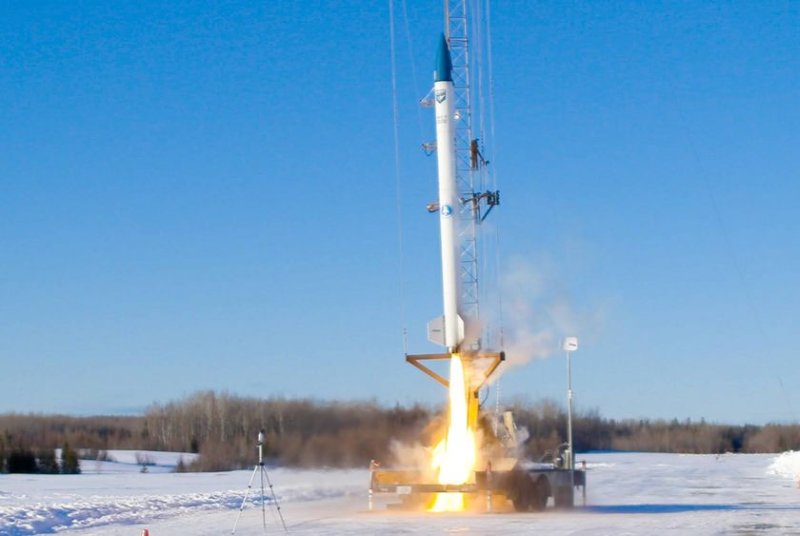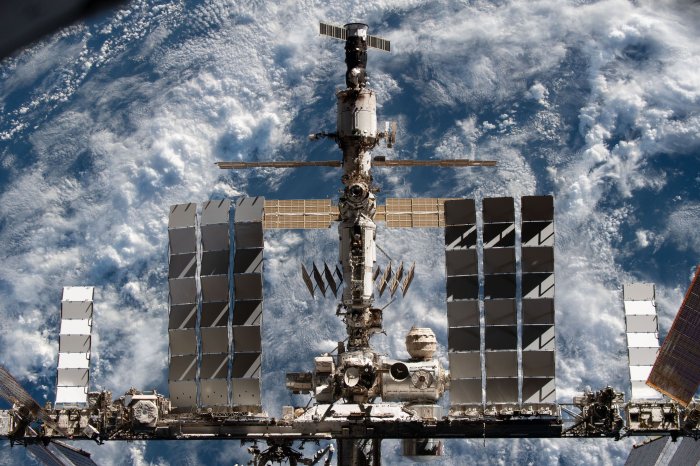[ad_1]
bluShift Aerospace on February 4, 2021, released the Stardust 1. rocket from Maine, its initially start as it seeks to deliver small satellite launches to the Pine Tree Condition. Photo courtesy of bluShift Aerospace/Twitter
BANGOR, Maine, June 7 (UPI) — Maine leaders have very long been seeking for methods to continue to keep extra of high university and college or university graduates from leaving the state. But lobstering and forestry, two stalwarts of the Maine economy, are not what they made use of to be.
Enter the new space financial system.
“There is a thing pretty about house,” Terry Shehata, government director of the Maine House Grant Consortium, a NASA-funded nonprofit, told UPI.
Maine — and its myriad of acreage, significantly from the light air pollution of the Eastern Seaboard’s important metropolises — has usually been a terrific position to gaze at the stars, but not always to launch rockets.
The miniaturization of satellites and the rockets wanted to set them into orbit, nonetheless, has modified the calculus. The barrier to entry is now small adequate that area, or at minimum minimal-Earth orbit, is no lengthier the unique playground of nationwide room agencies and large protection firms.
States not ordinarily associated with the aerospace marketplace — Maine and Michigan, for illustration — want in on the match.
Create it and they will arrive
In April, Maine Gov. Janet Mills signed LD 1923 into law, establishing the Maine Space Corp., a community-non-public partnership tasked with increasing the state’s aerospace marketplace.
When legislation goes into influence in August, the corporation will get to operate filling leadership roles and codifying their targets and governance. Then it will begin crafting a strategic system for the construction of the Maine Room Sophisticated, which will element launch web sites, an innovation hub and a facts analytics middle.
Final 12 months, a Maine-primarily based startup corporation, bluShift Aerospace, introduced the state’s 1st rocket. Even though it failed to quite attain room, it effectively showcased the abilities of the company’s “bio-derived” good gas.
bluShift, which hopes to start launching small satellites making use of its carbon-neutral rockets, is just one of quite a few businesses that Maine officials attained out to as they considered approaches for capturing a slice of the new place economy.
“We have been considering about how to consider the state to the up coming degree for some time now,” Shehata explained.
A lot more than a spaceport
Just before pushing in advance with LD 1923 and the Maine Space Corp., Shehata and the consortium worked with members of the legislature to assure Maine had constructed-in curiosity from companies, scientists and neighborhood leaders.
“We knew that just one of the essential belongings that Maine has is geography in terms of being on the Eastern Seaboard and one particular of the positions to start smaller satellites into polar orbits,” Shehata explained.
“But our principal issue has been whether we can capitalize on this new house financial system in a way that makes use of our exclusive belongings, spurs economic progress and workforce enhancement, and do so in a way that would allow us to continue to keep our students in this article in the point out.”
Surveys and marketplace analysis uncovered a healthier dose of local desire, but they also verified the suspicions of Shehata and many others that a spaceport wasn’t plenty of.
“What we’re doing is far more than a spaceport,” Shehata claimed. “In addition to spaceport, we resolved we desired to have this innovation heart and facts analytics hub to make absolutely sure we have a far more comprehensive complex.”
All three models will collect charges and will be equipped to survive fiscally on their personal, Shehata explained, but the three hubs will function collectively, as a coordinated, cohesive entity.
Constructing a a lot more complete elaborate was critical to making sure the condition created infrastructure that could be utilized by a diversity of groups, stated point out Sen. Mattie Daughtry, the bill’s direct sponsor, from communication companies to university student engineers.
Stakeholder range
“This is not about placing out an ‘open for business’ indication or attracting Elon Musk- and Jeff Bezos-fashion launches,” Daughtry informed UPI, talking of the bill. “It is about creating a management council that ensures all the unique events and stakeholders are doing the job together.”
For states with out a long background of aerospace exercise, a multifaceted approach is vital, explained Dylan Taylor, a big investor in the new area economy and CEO of Voyager, a area exploration firm.
“The most effective strategies are integrated methods where by schooling, technological innovation advancement, infrastructure, cash availability and the political assist all dovetail close to the marketplace,” Taylor explained to UPI in an e-mail. “Multi-stakeholder coordination is the key to good results.”
International knowledge, Maine apps
In addition to participating Maine’s college students, Shehata and Daughtry cited the significance of bridging connections involving the Maine Area Corp. and Maine’s industries on the ground.
Ali Abedi, professor of electrical and computer system engineering at the College of Maine, who testified in assist of LD 1923 previously this calendar year, is doing the job to style and construct tiny satellites outfitted with microspectral cameras.
“We can use these cameras to examine the concentrations of phytoplankton in the drinking water, so that could be useful to Maine’s aquaculture industry,” Abedi explained to UPI. “We can also use info from these cameras to analyze urban heat island outcomes.
“The third application is monitoring unique forests. By researching the shades in diverse sections of forests, we can see where by health conditions may possibly be spreading and harming the forest canopies.”
Modest satellites released in Maine could be utilized to analyze forest, fields, metropolitan areas and water bodies all around the world, though also assisting scientists keep an eye on the Pine Tree State’s possess purely natural means.
“We have to make sure that the worth of the space advanced arrives back to the a variety of sectors in Maine’s overall economy,” Shehata explained.
The earth economic system is increasingly data driven. If organizations in Maine can locate a way to collect precious data from reduced-Earth orbit, it will never be tricky to locate customers willing to fork out for it — at the very least, according to Taylor’s logic.
Facts, Taylor reported, is the attract.
“Now that we have a reusable, responsible and comparatively reasonably priced launch, there has been a flourishing of launching hardware into space,” Taylor said in an e-mail. “This in change is building a treasure trove of spaced-based mostly information.
“With this facts, entire new business models are becoming created. The capabilities are amazing, as evidenced by some of the room-based mostly info that arrived out of the Ukraine conflict from the non-public sector.”
Significantly of the data collected by modest satellites introduced from the Maine Place Sophisticated would not be for sale — it will be free, accessible to pupils at Maine’s universities for all sorts of investigate functions.
Wide advantages
Non-space industries will also reward from get the job done remaining done at the complex’s innovation hub, supporters of the bill explained.
“We previously have firms appropriate below in Maine that are pushing for weather-neutral launches and local weather-pleasant fuels,” Daughtry claimed.
The work could assist broader efforts to reduce the United States’ carbon footprint, she explained.
For many in the new space financial state, miniaturization is crucial. Attempts to squeeze extra tech into smaller sized confines require electronics and instruments to be as successful as achievable.
“Efforts to construct extra electricity-productive circuitry or lower-electricity radio conversation units with better info efficiency can benefit other locations of know-how,” Abedi claimed.
Financing and the potential
It will price $50 million to $250 million to assemble the Maine Room Elaborate, according to Shehata, but the Maine Place Corp. is not going to be starting up from scratch.
Officials assume to use some current infrastructure, together with a pair of armed forces facilities no for a longer time in use — Brunswick Naval Air Station in Southern Maine and Loring Air Force Foundation farther north, in the vicinity of the Canadian border.
It really is not distinct how the Maine Room Intricate will be funded, but Shehata explained the community-private partnership is very likely to go after federal grants, request out business associates and most likely even challenge bonds.
The grant consortium that Shehata oversees will assist the company get structured and provide some preliminary seed funding.
“We are likely to essentially give back-place of work services to the corporation with additional funds that we are securing from the federal federal government to establish up the infrastructure, and then in a handful of several years, we will phase aside and build a strategic partnership with the company,” he explained.
It can be about the kids
Supporters of LD 1923 and the Maine Area Complex count on the venture to be financially sustainable without direct assist from the point out treasury and Maine taxpayers, but Shehata and Daughtry explained facilitating collaboration is the major objective.
“The aim is to be owning a statewide exertion on this,” Daughtry said. “The issue that I am actually fired up about are the backlinks concerning the space intricate, place organizations and academics.
“I am really interested to see how higher faculty students use some of these lower-cost units.”
Shehata implies the Maine House Sophisticated could bring more than 5,500 substantial-paying careers to the point out by 2042.
If a high university pupil receives a possibility to study the state’s methods working with data captured by a satellite introduced from Maine, probably that engagement motivates them to pursue an engineering degree at the College of Maine.
And if the Maine House Corp. is thriving at capturing a slice of the new house economic climate — envisioned to be value $1.5 trillion by 2040 — maybe, just probably, upon graduation, that scholar is not going to have to seem outdoors the point out for a job in the aerospace industry.
The Global Place Station is pictured from the SpaceX Crew Dragon Endeavour in the course of a flyaround of the orbiting lab that took spot following its undocking from the Harmony module’s area-going through port on November 8. Photograph courtesy of NASA
[ad_2]
Supply hyperlink







More Stories
The Power of Investment for Financial Freedom
The Importance of Investing Early in Life
Building Wealth Through Smart Investment Choices